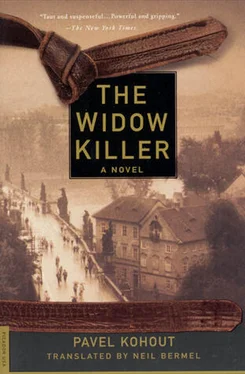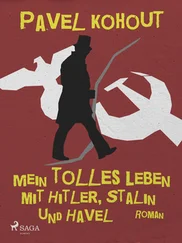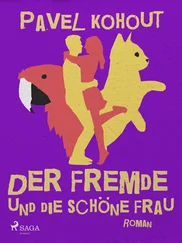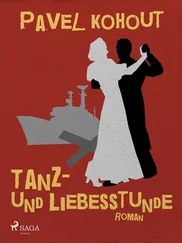Both Jitka and Jan had grown up in families that were a world unto themselves, and had spent their childhoods in an atmosphere of gruff tenderness. Just north of Moravia’s vineyards, nature seemed to have run out of the gifts she had been so profligate with farther south. Here she coddled no one. Economy was everything, starting with food. Children handed down shoes and clothing until the oft-mended uppers and fabrics gave out.
Caresses, not sweets or presents, were the only signs of affection for the youngest offspring — and those often hurt, since hardened calluses covered their parents’ palms. And when that same hand punished them — as it occasionally and reluctantly did — its traces were visible on the skin for days afterward. However, one thing neither Jan nor Jitka could ever remember was a conscious injustice. Once, when Jan was beaten instead of the true culprit (a stable boy who had blamed a broken jug on him and was later found out), his mother knelt before him and kissed the hand she had just thrashed.
Jan and Jitka first spotted each other in Beran’s anteroom. It was just before his promotion to assistant detective; she had arrived under the work exchange, a Nazi order that uprooted young people from their native villages, breaking the ties that might lead them into the Resistance. The very first words they exchanged brought them closer together: their south Moravian accents marked them as clearly as a scent identifies a flower. Their deeply ingrained modesty did not, of course, permit them to show their interest. It took them a year to get farther than “good morning” and until recently they had addressed each other formally, but their warm smiles — his as gentle as hers— confirmed they shared a common temperament.
Their meeting as lovers on the day the bombs reached Prague was therefore natural — and practically foreordained.
He never doubted they would stay together afterward, nor did he need to ask; it was further proof of the link their shared roots had forged. Young couples can have trouble adapting to sudden communality and often falter on it, unable to overcome the selfishness of differing habits, but from the first time Jitka and Jan woke up together, their common language smoothed over the minor differences in their characters. Their opinions and needs merged; they became in truth “one soul — one body.”
When they boarded the tram at the long-closed National Theater, the working day with all its filth was simply forgotten, as if they were never going to return. At home they cleaned and cooked together, discovering new stories that mapped out the part of their lives when, incredibly enough, they had not known each other, and in love they learned more about one another. This time of innocence would end each morning as Jan awoke. Holding Jitka close in his embrace, he would let his brain get to work.
Today, exceptionally, his mind was already racing before bedtime. In her second month of pregnancy Jitka felt worse than ever before. Her frequent indisposition made her tired during the day; lethargy dulled her appetite and her ensuing weakness made her stomach more irritable. It was a vicious circle that accelerated as time went on. Beran spared her as much as he could; he even suggested that she take sick leave, but she refused.
“Then I would really fall apart. It’s work that’s holding me together right now.”
Morava knew she did not want to leave him alone with his string of failures, and in return he arranged something to look forward to: Saturday, April twenty-eighth, would be their wedding in Jitka’s hometown church, and he had already filed the applications. Both families had agreed by letter that if the front moved dramatically before then, they would marry in Prague, in a civil ceremony; it was unthinkable that Jitka should remain single as their child grew inside her.
That day became a magic date for him. He had learned from Beran that a good detective always sets a deadline for cracking the case, even if the deadline was only a personal one. Now the repeated newspaper announcement and the confidential information they had sent had brought in a stream of warnings and reports, and it was up to him to solve it in time. He had no doubt that the butcher was planning to strike again, and this time he wanted to be quicker.
The killer, he felt, was already in his closely woven web, and Morava’s greatest fear was that some accident of fate would let the man slip through a slack loop. Although his most experienced people were reviewing the reports as they came in (so long as none of them were busy directing the graveyard operation), he tried at least to have a look at all of them. In doing so he realized he had come to rely on Buback as well.
At a certain point — actually, since his mysterious dinner with Jitka— the German had begun to cooperate enthusiastically and with impressive results. During their daily consultations, Morava noticed that the chief inspector was fingering the same sort of suspects he was. One time he mentioned it and had the impression his overseer was even pleased.
Today, Jitka had fallen asleep as soon as they arrived home. Morava opened his briefcase and removed the materials he had prudently smuggled with him. Making his way quietly down to the kitchen, he spread the new leads across the table like playing cards. In about fifty cases, his intuition had coincided with Buback’s: half a hundred fates marked by a predilection for perversion. Almost none of the fellows (all were men) had cropped up on the criminal register, and the few who had were down for minor offenses: three petty thefts, one drunken vandalism, and one slight injury.
The public servants they had contacted were deeply shaken by the detailed description of the murders. They had taken pains to observe their patients, clients, guests, neighbors, and other people who they sensed might harbor traces of exceptional if hidden brutality. A good half of the reports concerned repeated mistreatment of women, children, and animals. The majority took place behind closed doors at home, and therefore had been classified, albeit with some sense of discomfort, as private affairs.
A slew of the men were barroom brawlers, prone to brutalize other pub customers over a difference of opinion, a game, or just because they were too drunk to care. A couple of cases mentioned torture, and the witnesses belatedly reproached themselves for not having the courage to step in. In the end all were concluded by settling the score somehow, with the participants agreeing to hush up the affair.
For obvious reasons the rape cases interested Morava most. In some, women were tied up and subjected to sadistic assaults. It amazed him how many serious offenses like these went unpunished, because the victims either let themselves be bought off or did not dare to press charges for fear of retribution. He marked as “urgent” the case of one barber who, according to the examining surgeon’s report, had sliced into his unwilling lover’s breasts, but later prevailed on his victim to change her statement, apparently compensating her financially as well.
The remaining reports did not fit any one profile: there were exhibitionists, sodomites, voyeurs, and other deviants indulging their aggressive whims. Under the Nazis, unlawful firearms possession by a Czech usually meant death by firing squad, so knives were now the weapon of choice.
A few unclear reports were left over. Instead of containing direct leads, they were requests for consultations. None of them sounded urgent enough to require immediate action; Morava saw them as fallbacks in case the other trails led nowhere. For example, there was one note requesting the police to kindly visit the rectory in the north Bohemian town of Klá  terec u Teplic. It concerned the disappearance of a picture of Saint Reparata, which was later returned by the thief.
terec u Teplic. It concerned the disappearance of a picture of Saint Reparata, which was later returned by the thief.
Читать дальше

 terec u Teplic. It concerned the disappearance of a picture of Saint Reparata, which was later returned by the thief.
terec u Teplic. It concerned the disappearance of a picture of Saint Reparata, which was later returned by the thief.










